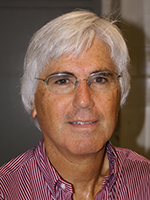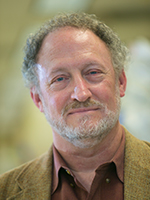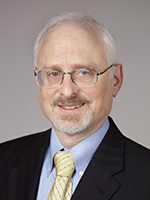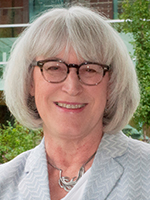Charles Chavkin, PhD
 Charles Chavkin received his BA in biology from Cornell University in 1974 and his PhD in pharmacology from Stanford University in 1982 under the mentorship of Professor Avram Goldstein. He was a postdoctoral fellow with Dr. Floyd Bloom at the Salk
Institute and Scripps Clinic. Dr. Chavkin was appointed as an Assistant Professor of Pharmacology at the University of Washington School of Medicine in 1985. He advanced to Associate Professor in 1991 and to Professor in 1997. He currently holds the
Allan & Phyllis Treuer Endowed Chair of Pain Research at the University of Washington. Since 2002, he has served as the Director of the UW Center for Drug Addiction Research, which includes a NIDA-T32 funded pre- and postdoctoral training program
and NIDA-P30 shared resource and training facility for brain imaging and viral and genetic tool development. He is actively involved in mentoring and professional development of his more junior colleagues.
Charles Chavkin received his BA in biology from Cornell University in 1974 and his PhD in pharmacology from Stanford University in 1982 under the mentorship of Professor Avram Goldstein. He was a postdoctoral fellow with Dr. Floyd Bloom at the Salk
Institute and Scripps Clinic. Dr. Chavkin was appointed as an Assistant Professor of Pharmacology at the University of Washington School of Medicine in 1985. He advanced to Associate Professor in 1991 and to Professor in 1997. He currently holds the
Allan & Phyllis Treuer Endowed Chair of Pain Research at the University of Washington. Since 2002, he has served as the Director of the UW Center for Drug Addiction Research, which includes a NIDA-T32 funded pre- and postdoctoral training program
and NIDA-P30 shared resource and training facility for brain imaging and viral and genetic tool development. He is actively involved in mentoring and professional development of his more junior colleagues.
Since 1980, his research program has been focused on understanding the molecular signaling of the endogenous dynorphin opioids and their mu and kappa opioid receptors. He described the structural features of the dynorphin peptides required for their kappa
opioid receptor selectivity and demonstrated that the dynorphins are the endogenous ligands for the kappa receptors. He currently uses a combination of molecular pharmacological, biophysical, anatomical, genetic and behavioral techniques to study
the functional properties of the endogenous opioid systems in the mouse brain. He has characterized the functional selectivity of kappa opioid agonists and antagonists, and he has characterized the roles of GRKs and JNKs in mu and kappa receptor desensitization
mechanisms. His studies of the neurotransmitter properties the dynorphins have revealed that the endogenous dynorphins are released in response to stressful experience, that they physiologically activate kappa opioid receptors to regulate G-protein
and MAPK signaling responses, and that they encode the dysphoric, anxiogenic and cognitive disrupting effects of persistent uncontrollable stress exposure. These molecular pharmacological analyses have suggested the kappa receptor antagonists will
have therapeutic utility promoting stress resilience for the treatment of addictions and mood disorders. His current studies are designed to further characterize how specific neural circuits controlling stress-induced potentiation of drug reward are
regulated by the dynorphin/kappa receptor systems.
His honors include being appointed as the Cornelius Wiersma Visiting Professor of Neurosciences at the California Institute of Technology (1993), elected as President of the International Narcotics Research Conference (1998-2002), chosen
for a MERIT Award, and K05 Senior Scientist & Mentoring Award from National Institute on Drug Abuse. He was elected AAAS-Fellow (Pharmaceutical Sciences), elected Fellow of the American College of Neuropsychopharmacology, and elected Member of
the Washington State Academy of Sciences. He gave the INRC Founders’ Lecture (2011), Kang Tsou Memorial Lecture for the International Cannabinoid Society (2013), and the Louis B. Flexner Lecture at the University of Pennsylvania (2017).
P. Jeffrey Conn, PhD
 P. Jeffrey Conn is the Lee E. Limbird Chair and Professor of Pharmacology at Vanderbilt University School of Medicine. He is the Founding Director and Director Emeritus of the Warren Center for Neuroscience Drug Discovery (WCNDD) at Vanderbilt.
Dr. Conn received his PhD from Vanderbilt in 1986 and pursued postdoctoral studies at Yale University before joining the faculty at Emory University in 1988. Dr. Conn served as head of the Department of Neuroscience at Merck and Company (West
Point, PA) from 2000–2003 then moved to Vanderbilt as founding director of the WCNDD. He is also co-founder and founding member of the Board of Directors of Appello Pharmaceuticals, which is focused on advancing new treatments for serious
brain disorders. Dr. Conn continues to serve as a member of the Board of Directors of Appello Pharmaceuticals.
P. Jeffrey Conn is the Lee E. Limbird Chair and Professor of Pharmacology at Vanderbilt University School of Medicine. He is the Founding Director and Director Emeritus of the Warren Center for Neuroscience Drug Discovery (WCNDD) at Vanderbilt.
Dr. Conn received his PhD from Vanderbilt in 1986 and pursued postdoctoral studies at Yale University before joining the faculty at Emory University in 1988. Dr. Conn served as head of the Department of Neuroscience at Merck and Company (West
Point, PA) from 2000–2003 then moved to Vanderbilt as founding director of the WCNDD. He is also co-founder and founding member of the Board of Directors of Appello Pharmaceuticals, which is focused on advancing new treatments for serious
brain disorders. Dr. Conn continues to serve as a member of the Board of Directors of Appello Pharmaceuticals.
Dr. Conn served as Editor-in-Chief of Molecular Pharmacology, on editorial boards of multiple other journals, and Scientific Advisory Boards of multiple foundations and companies. He has received numerous national and international awards
for his basic neuroscience and translational research.
The primary focus of research in the Conn laboratory is to develop a detailed understanding of the cellular mechanisms involved in regulating signaling through identified brain circuits that are impacted in neurological and psychiatric disorders and
insights that this may provide for development of novel therapeutic strategies. The primary mission of his lab and of the WCNDD is to build on fundamental breakthroughs in neuroscience to develop novel treatment strategies for brain disorders.
His lab focuses specific efforts on metabotropic glutamate receptors and muscarinic acetylcholine receptors and the roles of individual receptor subtypes in regulating brain function. He pioneered discovery and characterization of allosteric modulators
of G protein-coupled receptors (GPCRs), which represents a fundamentally new area that is impacting all GPCR research. Dr. Conn builds on these advances to develop novel treatments for schizophrenia, Parkinson’s disease, and other CNS disorders.
These efforts have generated multiple drug candidates that are advancing to clinical development at Vanderbilt and in collaboration with multiple pharmaceutical companies. These represent novel approaches with potential for providing fundamental
advances in patient care.
Michael A. Frohman, MD, PhD
 Michael Frohman graduated from the University of Michigan with a BS in chemistry with Distinction and High Honors in cellular & molecular biology before undertaking MD-PhD (immunology) training at the University of Pennsylvania. He was then
a postdoctoral fellow at the University of California, San Francisco prior to becoming a faculty member at Stony Brook University (SBU) in the Department of Pharmacological Sciences in 1992. Institutional activities at SBU included initiating
a molecular cloning university core, directing the medical pharmacology course for eight years, directing the NIH-funded MSTP (MD-PhD) training program since 2003, being Chair of Pharmacological Sciences since 2007, and Associate Director for
Education for the Cancer Center since 2018.
Michael Frohman graduated from the University of Michigan with a BS in chemistry with Distinction and High Honors in cellular & molecular biology before undertaking MD-PhD (immunology) training at the University of Pennsylvania. He was then
a postdoctoral fellow at the University of California, San Francisco prior to becoming a faculty member at Stony Brook University (SBU) in the Department of Pharmacological Sciences in 1992. Institutional activities at SBU included initiating
a molecular cloning university core, directing the medical pharmacology course for eight years, directing the NIH-funded MSTP (MD-PhD) training program since 2003, being Chair of Pharmacological Sciences since 2007, and Associate Director for
Education for the Cancer Center since 2018.
Dr. Frohman’s major research accomplishments include developing the 5' RACE-PCR cloning protocol, the original publication of which has been cited more than 6,000 times, and cloning and characterizing the Phospholipase D (PLD) superfamily of
lipid signaling enzymes, for which small molecule therapeutics are now in development to target thrombotic disease and cancer. The initial PLD cloning and inhibitor reports have been highly cited in connection to probing cellular, physiological,
and disease-impacting roles for PLD1 and PLD2. Recent publications involved collaborative efforts to determine the crystal structure of PLD1, which will facilitate inhibitor development, and identification of PLD1 mutations as a cause of congenital
heart disease. Continuously NIH-funded since 1993, Dr. Frohman has authored over 200 reports (h-index 84) and been recognized by election into the Association of American Physicians (AAP), as a Fellow of the American Association for the Advancement
of Science, as a member of the National Association of Inventors, and as a SUNY Distinguished Professor. Dr. Frohman has trained over 50 students and fellows (20% from backgrounds of diversity), most of whom have developed their own research-connected
career paths.
Additional contributions to the discipline of pharmacology have included serving as a councilor and then president of the Association of Medical School Pharmacology Chairs and being on numerous NIH study sections for signal transduction and therapeutics
topics. In addition, Dr. Frohman has served on the editorial boards for Molecular and Cellular Pharmacology, the Handbook of Experimental Pharmacology (HEP), and the Journal of Pharmacology and Experimental Therapeutics (JPET). Dr. Frohman has been a member of ASPET for 20 years, co-chairing a symposium and serving on the ASPET Awards Committee. Mentoring has been a large component of Dr. Frohman’s efforts over the years. In addition to the trainees
in his own lab, who ranged from high school students to research assistant professors, Dr. Frohman has overseen the recruitment, training, and graduation of more than 130 MD-PhD students in his role as MSTP Director. Dr. Frohman has also recruited
a dozen faculty to the Department of Pharmacological Sciences, all of whom were successful and subsequently promoted with tenure. He has also mentored many junior faculty in other departments across the medical school and life science departments.
These activities were recognized with a School of Medicine Excellence in Faculty Mentoring Award.
Beverley Greenwood-Van Meerveld, PhD
 Beverley Greenwood-Van Meerveld is currently Professor Emeritus of Physiology at the University of Oklahoma Health Sciences Center. She received her undergraduate degree with special honors in physiology from the University of Sheffield in 1983
and then gained post-doctoral training from the University of Calgary as an Alberta Heritage Foundation Scholar. In 1986, she moved to the Medical College of Wisconsin as an Assistant Professor of Pharmacology & Toxicology under the guidance
of Dr. Harold F. Hardman. After gaining industrial research experience at Eli Lilly and Company (1990-1994), she moved to Oklahoma to become the Scientific Director of the Oklahoma Foundation for Digestive Research. In 2003, Dr. Greenwood-Van
Meerveld was appointed the Director of the Oklahoma Center for Neuroscience and the Presbyterian Health Foundation Endowed Chair in Neurosciences at the University of Oklahoma Health Sciences Center. For the next 17 years she led the Oklahoma
Center for Neuroscience and was involved in graduate student training, neuroscience research, and community outreach (NeuroNight). In 2014, her teaching and mentoring excellence was recognized when she was inducted into the University of Oklahoma
Health Sciences Center, College of Medicine Academy of Teaching Scholars. At the time of her retirement in April 2021, Dr. Greenwood-Van Meerveld was a prestigious George Lynn Cross Professor of Physiology and a President’s Associates Presidential
Professor. For most of her career, Dr. Greenwood-Van Meerveld was very active in the Department of Veterans Affairs and was the Chair of the local VA Animal Care and Use Committee and Chair of the VA Research and Development Committee. At
the time of her retirement, she had reached the level of a Senior VA Career Scientist and still serves as the Chair of the Neurology P VA Merit Review Board and Chair of the Biomedical Laboratory and Clinical Science R&D Scientific VA Merit
Review Board.
Beverley Greenwood-Van Meerveld is currently Professor Emeritus of Physiology at the University of Oklahoma Health Sciences Center. She received her undergraduate degree with special honors in physiology from the University of Sheffield in 1983
and then gained post-doctoral training from the University of Calgary as an Alberta Heritage Foundation Scholar. In 1986, she moved to the Medical College of Wisconsin as an Assistant Professor of Pharmacology & Toxicology under the guidance
of Dr. Harold F. Hardman. After gaining industrial research experience at Eli Lilly and Company (1990-1994), she moved to Oklahoma to become the Scientific Director of the Oklahoma Foundation for Digestive Research. In 2003, Dr. Greenwood-Van
Meerveld was appointed the Director of the Oklahoma Center for Neuroscience and the Presbyterian Health Foundation Endowed Chair in Neurosciences at the University of Oklahoma Health Sciences Center. For the next 17 years she led the Oklahoma
Center for Neuroscience and was involved in graduate student training, neuroscience research, and community outreach (NeuroNight). In 2014, her teaching and mentoring excellence was recognized when she was inducted into the University of Oklahoma
Health Sciences Center, College of Medicine Academy of Teaching Scholars. At the time of her retirement in April 2021, Dr. Greenwood-Van Meerveld was a prestigious George Lynn Cross Professor of Physiology and a President’s Associates Presidential
Professor. For most of her career, Dr. Greenwood-Van Meerveld was very active in the Department of Veterans Affairs and was the Chair of the local VA Animal Care and Use Committee and Chair of the VA Research and Development Committee. At
the time of her retirement, she had reached the level of a Senior VA Career Scientist and still serves as the Chair of the Neurology P VA Merit Review Board and Chair of the Biomedical Laboratory and Clinical Science R&D Scientific VA Merit
Review Board.
Dr. Greenwood-Van Meerveld was actively involved in research and the first grant that jump-started her research career was from the Pharmaceutical Manufacturers Association Young Investigator program. Dr. Greenwood-Van Meerveld’s research expertise
is the neuropharmacology of visceral pain of gastrointestinal origin. For most of her career, her research focused on the central nervous system regulation of visceral pain with a strategic objective of using preclinical (in vivo and in vitro)
rodent models and multiple state-of-the-art techniques, from molecular and cellular to behavioral, pharmacological, and electrophysiological methods. She studied the neuroanatomical and neuropharmacological substrates involved in the interaction
between visceral pain and anxiety. She demonstrated long-lasting increases in anxiety-like behavior and viscerosomatic sensitivity in response to stress. Her laboratory found persistent down-regulation of GR expression and increases in the expression
of CRF and HCN1 channels leading to hyper-excitability of the CeA neurons. The objective of her more recent experiments focused on understanding sex differences in visceral pain in response to various forms of adverse early life stress (ELS).
Dr. Greenwood-Van Meerveld’s laboratory also has a long history of engaging pharma to identify novel drugs to treat visceral pain and GI disorders such as irritable bowel syndrome, inflammatory bowel disease, and post-operative ileus. Her
pharma-funded research has impacted the field significantly through multiple presentations at national meetings and high impact publications.
During her career, Dr. Greenwood-Van Meerveld was a highly productive researcher with over 160 peer-reviewed manuscripts, 26 invited reviews, 26 books/book chapters and 9 US patents. At the time of her retirement, Dr. Greenwood-Van Meerveld
was serving as the principal investigator (PI) of an active NIH-R01 (2019-2023), as well as PI of a VA Merit grant, PI on a grant from the Oklahoma Center for the Advancement of Science and Technology (OCAST), and PI of numerous industry pharma
contracts. Dr. Greenwood-Van Meerveld’s international scientific reputation was recognized by her receipt of the 2004 Janssen Award for Basic Research in Digestive Diseases, the 2012 Oklahoma University Regent Award for Superior Research
and Creative Activity, a Regents Presidential Professorship (2017-2021), and a prestigious George Lynn Cross Research Professorship (2020). Dr. Greenwood-Van Meerveld has held key leadership positions locally and nationally; she served as the
President of the American Neurogastroenterology and Motility Society (ANMS) from 2018-2020 and is currently the Chair of the ANMS Institute. She was Chair of the Editorial Board of Neurogastroenterology & Motility until July 2021 and in 2021
became the Specialty Chief Editor for Frontiers in Abdominal and Pelvic Pain.
Dr. Greenwood-Van Meerveld has been a member of ASPET for many years and is currently an ASPET Emeritus member. During her career, she has served in multiple leadership roles in ASPET including her service as Chair of the Division for Neuropharmacology
(2015-2017), as well as serving as an Associate Editor for the Journal of Pharmacology and Experimental Therapeutics from 2012-2018. She continued her ASPET service as a member of the ASPET Board of Publications Trustees (now Publications
Committee) from 2018-2020. Dr. Greenwood-Van Meerveld also chaired and organized multiple ASPET symposia including Novel Approaches to Treat Anxiety, Anaheim CA (2010) and Future Therapies for Chronic Pain, San Diego, CA (2014).
She was also very involved in the ASPET Division for Neuropharmacology Postdoctoral Fellow Competition and in 2016 chaired the competition, San Diego CA. Dr. Greenwood-Van Meerveld is also a Fellow of the American College of Gastroenterology and
Fellow of the American Gastroenterological Association.
T. Kendall Harden, PhD
 T. Kendall Harden received a BS in chemistry from Delta State University in 1970 and a PhD in pharmacology at the University of Mississippi School of Medicine in 1974. His postdoctoral training was with Perry Molinoff in the Department of Pharmacology
at the University of Colorado School of Medicine. Dr. Harden joined the Department of Pharmacology at the University of North Carolina (UNC) as an Assistant Professor in 1977 and was named Kenan Professor of Pharmacology at UNC in 2003.
T. Kendall Harden received a BS in chemistry from Delta State University in 1970 and a PhD in pharmacology at the University of Mississippi School of Medicine in 1974. His postdoctoral training was with Perry Molinoff in the Department of Pharmacology
at the University of Colorado School of Medicine. Dr. Harden joined the Department of Pharmacology at the University of North Carolina (UNC) as an Assistant Professor in 1977 and was named Kenan Professor of Pharmacology at UNC in 2003.
Dr. Harden’s research has provided molecular understanding of G protein-regulated phospholipase C and inositol lipid signaling and molecular and pharmacological insight on G protein-coupled receptors, including beta-adrenergic, muscarinic cholinergic,
and nucleotide-activated P2Y receptors. This work is published in 240 peer-reviewed papers, and Dr. Harden is author of 80 research reviews and book chapters. He was among the ten most-cited (ISI) investigators in pharmacology from 1993-2003,
and he was among the top fifty most-cited (ISI) in pharmacology from 1981-1999. He was an Established Investigator of the American Heart Association from 1981-1986, received a Merit Award (1993-2003) from NIGMS, and is a Fellow of the American
Association for the Advancement of Science. Dr. Harden directed the PhD research of 25 students at UNC and trained 45 postdoctoral fellows.
Dr. Harden has been a member of ASPET since 1980. He served as Editor of Molecular Pharmacology from 1990-1994 and was Chair of the Board of Publications Trustees (now Publications Committee) of ASPET from 1996-2001. He served on the editorial
boards of the Journal of Pharmacology and Experimental Therapeutics from 1981-1988 and of Molecular Pharmacology from 1982 to 1990.
Kenneth A. Jacobson, PhD
 Kenneth A. Jacobson received his BA in liberal arts from Reed College in 1976 and his PhD in chemistry from the University of California, San Diego in 1981, where he studied b-adrenergic receptors and peptide science. After postdoctoral training
at the Weizmann Institute from 1981-1983, he joined the National Institute of Diabetes and Digestive and Kidney Diseases (NIDDK) at the National Institutes of Health (NIH), in Bethesda, MD. He is currently Senior Investigator and Chief of the
Molecular Recognition Section in the Laboratory of Bioorganic Chemistry. His Section is interdisciplinary, comprising G protein-coupled receptor (GPCR) pharmacology and drug discovery, as well as structural biology and computational modeling
of GPCR interactions. Since 2018, he is also the John W. Daly Distinguished Scientist at NIDDK, named after Dr. Jacobson’s early mentor at NIH.
Kenneth A. Jacobson received his BA in liberal arts from Reed College in 1976 and his PhD in chemistry from the University of California, San Diego in 1981, where he studied b-adrenergic receptors and peptide science. After postdoctoral training
at the Weizmann Institute from 1981-1983, he joined the National Institute of Diabetes and Digestive and Kidney Diseases (NIDDK) at the National Institutes of Health (NIH), in Bethesda, MD. He is currently Senior Investigator and Chief of the
Molecular Recognition Section in the Laboratory of Bioorganic Chemistry. His Section is interdisciplinary, comprising G protein-coupled receptor (GPCR) pharmacology and drug discovery, as well as structural biology and computational modeling
of GPCR interactions. Since 2018, he is also the John W. Daly Distinguished Scientist at NIDDK, named after Dr. Jacobson’s early mentor at NIH.
Dr. Jacobson’s pioneering research on the adenosine and P2Y nucleotide receptors, two classes of GPCRs, beginning in 1983 has been a major force in promoting that field toward clinically useful agents. In addition to his well-known work on adenosine
receptors, he collaborated with Geoffrey Burnstock (University College London) and T. K. Harden (University of North Carolina), to embark on a nearly 30-year investigation of P2Y receptors. His collaboration with Ray Stevens (University of Southern
California) resulted in the first X-ray structural elucidation of P2Y receptors and an agonist-bound A2A receptor, and the Jacobson lab utilizes these structures to guide ligand discovery and computationally predict receptor function.
Dr. Jacobson discovered the first A3 adenosine receptor agonists and antagonists, and he explored the role of this receptor in cerebroprotection, cardioprotection, glaucoma and chronic neuropathic pain. He has investigated the role of P2Y receptors
in diabetes, thrombosis, asthma, pain, and cancer. Dr. Jacobson has formed several official NIH alliances with pharma companies through collaborative (CRADA) agreements to find new treatments for inflammatory diseases, traumatic brain injury and
stroke, thrombosis, and acute kidney injury. Several of the numerous patents on which he is inventor are licensed through NIH for pharmaceutical development. Two nucleosides invented and studied pharmacologically by the Jacobson laboratory are
already in advanced clinical trials for treatment of psoriasis, hepatocellular carcinoma, and non-alcoholic steatohepatitis (NASH). Six biopharma companies were founded based on his therapeutic candidate molecules. Over 35 compounds introduced
by Dr. Jacobson and coworkers are available commercially as pharmacological research tools, and many are designated “MRS” after his Section. These compounds have been essential in countless biological studies to further our understanding
of the physiological role of purinergic transmission.
He has published more than 800 scientific publications, with an H-index of 110. His numerous awards include: 2008 Sato Memorial International Award of the Pharmaceutical Soc. of Japan; 2009 Pharmacia ASPET Award for Experimental Therapeutics; 2009
Medicinal Chemistry Hall of Fame (American Chemical Soc.); 2014 ASPET Goodman and Gilman Award in Drug Receptor Pharmacology; 2014 Philip S. Chen Lecture Award for Technology Transfer, NIH; 2016-present, Highly Cited Researcher in Pharmacology
and Toxicology (Clarivate Analytics); 2017 Smissman Award, American Chemical Soc.; 2017 NIH Director's Award. Dr. Jacobson is also a Fellow of the American Chemical Society.
Dr. Jacobson has been an active member of ASPET since 1988. He serves as an Associate Editor of Purinergic Signalling and Advisory Board member of Molecular Pharmacology and other journals. Dr. Jacobson serves on the IUPHAR Committees
on P2Y Purinoceptors and on Adenosine Receptors. As an active member of NIH Assembly of Scientists Council and its Travel and Workforce Committees, he promotes the cause of greater minority representation among NIH staff. Dr. Jacobson has mentored
more than 70 postdoctoral fellows from 15 countries, as well as postbaccalaureate fellows and summer students, many of whom were inspired to continue in science by their experience in the Jacobson lab.
Kathryn E. Meier, PhD
 Kathryn “Kay” Meier currently serves as Interim Chair and Professor of Pharmaceutical Sciences at Washington State University College of Pharmacy and Pharmaceutical Sciences. She was trained at the University of California San Diego,
University of Wisconsin, and University of Washington, and held previous faculty appointments at the UW and at Medical University of South Carolina (MUSC). Her research, resulting in 88 peer-reviewed publications, has been funded by grants from
NIH, NSF, DOD, Ferring Research Institute, and the American Society for Pharmacology and Experimental Therapeutics (ASPET). The primary focus of this research has been on GPCR-mediated signal transduction, particularly protein phosphorylation
and phospholipid metabolism, in cancer cells. Dr. Meier has been honored with awards for her efforts with respect to mentoring and STEM diversity.
Kathryn “Kay” Meier currently serves as Interim Chair and Professor of Pharmaceutical Sciences at Washington State University College of Pharmacy and Pharmaceutical Sciences. She was trained at the University of California San Diego,
University of Wisconsin, and University of Washington, and held previous faculty appointments at the UW and at Medical University of South Carolina (MUSC). Her research, resulting in 88 peer-reviewed publications, has been funded by grants from
NIH, NSF, DOD, Ferring Research Institute, and the American Society for Pharmacology and Experimental Therapeutics (ASPET). The primary focus of this research has been on GPCR-mediated signal transduction, particularly protein phosphorylation
and phospholipid metabolism, in cancer cells. Dr. Meier has been honored with awards for her efforts with respect to mentoring and STEM diversity.
At the national level, Dr. Meier serves as a reviewer for multiple government agencies (VA, DOD, NSF, NIH). With respect to professional societies, she is particularly active as a member of ASPET, where she has served as an officer in the Division
for Molecular Pharmacology, member of the Board of Publications Trustees (now Publications Committee), Associate Editor for the Journal of Pharmacology and Experimental Therapeutics, and currently as Editor-in-Chief of Molecular Pharmacology.
She has also been active in the American Physiological Society (APS), serving on the editorial board of the American Journal of Physiology (Cell Physiology), and previously as a member of the APS Science Policy Committee. Dr.
Meier is a member of the Washington State Academy of Sciences, and a Fellow of the American Association for the Advancement of Science (AAAS), APS, and ASPET.
Edward T. (Eddie) Morgan, PhD
 Edward T. (Eddie) Morgan is Professor and Vice Chair for Academic Affairs in the Department of Pharmacology and Chemical Biology at Emory University School of Medicine in Atlanta, GA. He earned his PhD in pharmacology from the University of
Glasgow. As a postdoctoral fellow with Jud Coon at the University of Michigan, Dr. Morgan teamed with Dennis Koop to identify, purify, and characterize CYP2E1. At the Karolinska Institute, he led a team to demonstrate that expression of sex-specific
cytochrome P450s in rodents is determined by the pulsatile pattern of growth hormone secretion. Dr. Morgan is an international leader in the regulation of cytochrome P450 enzymes by inflammatory stimuli and the underlying mechanisms. His most
current research is focused on developing methods to annotate the human xenobiotic metabolome.
Edward T. (Eddie) Morgan is Professor and Vice Chair for Academic Affairs in the Department of Pharmacology and Chemical Biology at Emory University School of Medicine in Atlanta, GA. He earned his PhD in pharmacology from the University of
Glasgow. As a postdoctoral fellow with Jud Coon at the University of Michigan, Dr. Morgan teamed with Dennis Koop to identify, purify, and characterize CYP2E1. At the Karolinska Institute, he led a team to demonstrate that expression of sex-specific
cytochrome P450s in rodents is determined by the pulsatile pattern of growth hormone secretion. Dr. Morgan is an international leader in the regulation of cytochrome P450 enzymes by inflammatory stimuli and the underlying mechanisms. His most
current research is focused on developing methods to annotate the human xenobiotic metabolome.
Dr. Morgan has been deeply involved in ASPET since 1993, when he chaired the nominating committee for the Division for Drug Metabolism and Disposition, and eventually became Councilor, and then Chair of the division in 1999. After serving on the Board
of Publications Trustees from 2005-2010, he joined ASPET Council as Secretary/Treasurer-Elect in 2011, and continued to serve on the Finance Committee and Investments Subcommittee until his election to President-Elect in 2017. As a member of the
Division for Systems and Integrative Pharmacology Executive Committee, Dr. Morgan also played a large part in the successful reformation of that division into what eventually became the Division for Translational and Clinical Pharmacology. Dr.
Morgan also served as Editor of Drug Metabolism and Disposition for 6 years and Associate Editor of Molecular Pharmacology for 5 years.
Dr. Morgan is highly committed to mentoring, diversity, equity and inclusion, activities that he views as greatly interdependent. He had leadership roles in the pharmacology graduate programs at Emory for 22 years, serving as director for 12 years.
In those roles (and thereafter) he devoted significant effort to the recruitment and retention of underrepresented students, personally visiting HBCUs all over the country and regularly attending the ABRCMS and SACNAS meetings. He also instituted
procedures for holistic review of applicants to the program. He is an MPI of Emory’s Initiative for Maximizing Student Development (IMSD) grant, in which he is responsible for mentorship of the graduate students in that program. Eddie
has trained 7 graduate students (3 MS; 4 PhD) and 15 postdoctoral fellows, as well as 2 postbaccalaureate (PREP) students and 7 undergraduate students, many of whom are from groups underrepresented in STEM. He is a founder and
the current President of the Atlanta Society of Mentors, which not only provides formal mentorship training to faculty and trainees, but also is a forum for discussion of mentoring across the Emory campus and Georgia State University.
Robert R. Ruffolo, PhD
 Robert Ruffolo is the former President of Research and Development for Wyeth Pharmaceuticals, and Corporate Senior Vice President of the Wyeth Corporation (now Pfizer). In those roles, he managed an R&D organization of 9,000 scientists
with an annual budget in excess of $3 billion. He is currently Managing Director of Ruffolo Consulting LLC, which serves the pharmaceutical and biotechnology industries.
Robert Ruffolo is the former President of Research and Development for Wyeth Pharmaceuticals, and Corporate Senior Vice President of the Wyeth Corporation (now Pfizer). In those roles, he managed an R&D organization of 9,000 scientists
with an annual budget in excess of $3 billion. He is currently Managing Director of Ruffolo Consulting LLC, which serves the pharmaceutical and biotechnology industries.
Dr. Ruffolo received his BS in pharmacy summa cum laude with distinctionand his PhD in pharmacology from The Ohio State University. He then spent two years as a postdoctoral fellow at the National Institutes of Health.
Dr. Ruffolo was instrumental in the discovery of several marketed products, including carvedilol (Coreg®) for congestive heart failure, ropinirole (Requip®) for Parkinson's disease, dobutamine (Dobutrex®) for acute congestive heart
failure and eprosartan (Teveten®) for hypertension. The R&D groups that he supervised during his career brought 31 FDA-approved new drugs to the market.
Dr. Ruffolo has authored over 500 full-length publications and over 200 abstracts, and edited 15 books. He was Editor-in-Chief of four international pharmacology journals, and was Field Editor of four other journals, including the Journal of Pharmacology and Experimental Therapeutics.
He served on 29 editorial boards. Dr. Ruffolo was Adjunct Professor of Pharmacology at Baylor, Ohio State, West Virginia and McGill Universities.
Dr. Ruffolo has received a number of awards throughout his career, including twoLifetime Achievement Awards (Ohio State University and Scrip) and two Honorary Doctorates (West Virginia University and University of Catania, Italy). He was recipient
of the Pharmaceutical Research and Manufacturers of America’s most prestigious award, theDiscoverer’s Award, for the discovery of carvedilol (Coreg®) for the treatment of congestive heart failure where it was highlighted that
carvedilol saved or prolonged the lives of tens of millions of patients around the world. Dr. Ruffolo received theChief Scientific Officer of the Year award for being named the best leader of Research and Development in the biopharmaceutical
industry. He has also been the recipient of the following awards: John Jacob Abel Award, Chauncey D. Leake Award, George B. Koelle Award, Lorenzini Gold Medal, Centennial Award for Drug Discovery, Prix Galien Special Commendation for Excellence
in Research, Prix Galien Innovative Research Award, and the Distinguished Alumni Awardfrom Ohio State University. Dr. Ruffolo was identified by PharmaVoice as one of the “100 most inspiring people in the life-sciences industry”,
and Pharmer listed Dr. Ruffolo among the most “distinguished pharmaceutical scientists” in the world. Med Ad News identified Dr. Ruffolo as “research’s shining star in the pharmaceutical industry”.
The ISI Atlas of Science identified Dr. Ruffolo as one the most “highly cited scientists in the world”, and the American Society for Information Science & Technology designated Dr. Ruffolo as a “highly
cited scientist” for being among the top 100 most cited pharmacologists in the world.
Dr. Ruffolo is an emeritus memberof ASPET and has been a member of ASPET for over 40 years. He has held a number of elected ASPET offices and served on many ASPET committees.
John D. Schuetz, PhD
 John Schuetz’s interest in transporters began in 1984 as a postdoctoral fellow working on the reduced folate carrier with renowned folate transport expert, I. David Goldman at Medical College of Virginia, now Virginia Commonwealth
University. While in the Goldman laboratory, he was mentored in molecular biology by a young faculty member, Eric H. Westin, a protégé of Robert Gallo, but his ultimate transition to ABC transporters was interrupted by a brief
sojourn with Phil Guzelian to clone and characterize regulation of CYP3A family members. This was a fortuitous journey because he learned firsthand about CYP3A substrate poly-specificity, knowledge that became crucial to developing the now
well-known concept of substrate interplay and interaction between drug metabolism by CYP3A and transport by P-glycoprotein (aka Pgp or ABCB1). His laboratory hypothesized and demonstrated this interplay, both functional and regulatory, between
the ABC transporter P-glycoprotein and the major drug-metabolizing enzyme CYP3A that has become a cornerstone in pharmacology for understanding drug interactions.
John Schuetz’s interest in transporters began in 1984 as a postdoctoral fellow working on the reduced folate carrier with renowned folate transport expert, I. David Goldman at Medical College of Virginia, now Virginia Commonwealth
University. While in the Goldman laboratory, he was mentored in molecular biology by a young faculty member, Eric H. Westin, a protégé of Robert Gallo, but his ultimate transition to ABC transporters was interrupted by a brief
sojourn with Phil Guzelian to clone and characterize regulation of CYP3A family members. This was a fortuitous journey because he learned firsthand about CYP3A substrate poly-specificity, knowledge that became crucial to developing the now
well-known concept of substrate interplay and interaction between drug metabolism by CYP3A and transport by P-glycoprotein (aka Pgp or ABCB1). His laboratory hypothesized and demonstrated this interplay, both functional and regulatory, between
the ABC transporter P-glycoprotein and the major drug-metabolizing enzyme CYP3A that has become a cornerstone in pharmacology for understanding drug interactions.
Dr. Schuetz joined the Department of Pharmaceutical Sciences at St. Jude Children’s Research Hospital in 1992. He rose through the ranks and was the Vice Chair of the Department from 2005 until recently in 2021. His laboratory has made numerous
fundamental transporter discoveries important to pharmacology which included the identification and functional deorphanization of a number of key ABC transporters. Through his lab’s work, these transporters have been shown to have
roles in stem cells, regulating signaling pathways and modulating disease processes, as well as revealing their transport of multiple endogenous and therapeutic compounds. Currently, his laboratory is elucidating how these transporters and
their protein complexes regulate tumorigenesis.
Dr. Schuetz has been very active in ASPET, serving as Chair of the Division for Toxicology and on ASPET Council as Councilor and President. He has served on various committees, including the Awards Committee and Program Committee. He has
had a key role in participating and organizing multiple ASPET symposia. Dr. Schuetz has also been active in promoting and disseminating pharmacological knowledge through his service on editorial boards of various ASPET journals. He currently
serves on the editorial boards of Drug Metabolism and Disposition and Pharmacological Reviews. Additionally, Dr. Schuetz is on the editorial board of the FASEB Journal. He has also promoted transporter pharmacology
through his active participation in other scientific meetings, including Gordon and FEBS conferences as well as playing key roles in organizing and participating in ABC transporter meetings in both North America and Europe.
With respect to mentorship, Dr. Schuetz is excited about continuing to train the next generation of pharmacologists (he currently has three graduate students). Over the course of his career as an independent investigator at St. Jude Children’s
Research Hospital, Dr. Schuetz has mentored young faculty and trained over thirty postdoctoral fellows. Many of these fellows have successfully assumed high ranking positions within academia, biotechnology, and pharmaceutical companies. Dr.
Schuetz is also proud of his mentorship of his undergraduate trainees, many of whom have afforded the opportunity through St. Jude’s partnership with Bath University in England. Several of these students have presented at Experimental
Biology and won ASPET travel and poster awards. In addition, he provides mentorship by co-leading the St. Jude Graduate School’s course in pharmacology and chemical biology.
Phil Skolnick, PhD, DSc (hon)
 Phil Skolnick is the Chief Scientific Officer at Opiant Pharmaceuticals. He received his undergraduate degree summa cum laude from Long Island University and a PhD (pharmacology) from the George Washington University. His career
at the NIH intramural research program spanned 25 years, beginning with a postdoctoral fellowship under Dr. John W. Daly and ending as Senior Investigator and Chief, Laboratory of Neuroscience, NIDDK. Dr. Skolnick left the NIH in 1997
to join Lilly Research Laboratories as a Lilly Research Fellow in Neuroscience and subsequently joined DOV Pharmaceutical, Inc. as its Chief Scientific Officer. He returned to the NIH in 2010 as the Director, Division of Therapeutics and Medical
Consequences at NIDA prior to assuming his current position.
Phil Skolnick is the Chief Scientific Officer at Opiant Pharmaceuticals. He received his undergraduate degree summa cum laude from Long Island University and a PhD (pharmacology) from the George Washington University. His career
at the NIH intramural research program spanned 25 years, beginning with a postdoctoral fellowship under Dr. John W. Daly and ending as Senior Investigator and Chief, Laboratory of Neuroscience, NIDDK. Dr. Skolnick left the NIH in 1997
to join Lilly Research Laboratories as a Lilly Research Fellow in Neuroscience and subsequently joined DOV Pharmaceutical, Inc. as its Chief Scientific Officer. He returned to the NIH in 2010 as the Director, Division of Therapeutics and Medical
Consequences at NIDA prior to assuming his current position.
More than 75 pre-and postdoctoral scientists have been trained in Skolnick’s laboratory, many of whom have gone on to distinguished careers in academia and industry. Dr. Skolnick has held multiple academic appointments, including Research
Professor of Psychiatry at the Uniformed Services University of the Health Sciences, Adjunct Professor of Anesthesiology at Johns Hopkins University, Adjunct Professor of Pharmacology and Toxicology at Indiana University School of Medicine,
and Research Professor of Psychiatry at New York University Langone Medical Center. An ASPET member since 1977, Dr. Skolnick has been a frequent speaker at its annual meetings and served on the Executive Committee of the Division for Neuropharmacology,
and on the Awards Committee.
Dr. Skolnick’s work on the pharmacology of ligand-gated ion channels has spanned more than three decades. His contributions to the field of GABAA receptor pharmacology range from identification of endogenous ligands modulating benzodiazepine
receptors to leading the development of ocinaplon, a non-benzodiazepine anxiolytic. Beginning in 1990, a series of studies from his laboratory formed the bases for development of glutamate-based antidepressants, most notably NMDA antagonists
such as ketamine.
Dr. Skolnick has co‑authored more than 560 articles and edited six books spanning both basic and clinical neuropsychopharmacology. ASPET has recognized this body of work with the ASPET Award for Experimental Therapeutics and the Ray Fuller Lecture
in the Neurosciences. Dr. Skolnick has also been recognized with an A.E. Bennett Award in Biological Psychiatry, an Anna-Monika Prize, the Donald F. Klein Lifetime Achievement Award from the American Society of Clinical Psychopharmacology,
and multiple distinguished lectureships. He was awarded the Doctor of Science, honoris causa by Long Island University and the University of Wisconsin-Milwaukee.
Dr. Skolnick was a founding editor of Current Protocols in Neuroscience and has served on the editorial advisory boards of more than a dozen journals. Dr. Skolnick served on the Steering Committee of the American Society of Clinical Psychopharmacology,
the Board of Directors of the Winter Conference on Brain Research, and the International Union of Pharmacology (IUPHAR) Subcommittee on Receptor Classification (GABAA receptors).
His current interests are focused on developing innovative therapies for treating addictions and drug overdose.
Alan V. Smrcka, PhD
 Alan Smrcka is currently the Benedict Lucchesi Collegiate Professor of Pharmacology at the University of Michigan. He received his PhD in biochemistry from the University of Arizona in 1990, did postdoctoral training in pharmacology at the
University of Texas Southwestern Medical Center with Dr. Paul Sternweis, started as a fulltime faculty member at the University of Rochester in 1994, and has been a Full Professor since 2007. Prior to his appointment in Michigan in 2016, he
held the Lewis C. Lasagna Endowed Professorship in Experimental Therapeutics at the University of Rochester School of Medicine. Dr. Smrcka was the Chair of the Division for Molecular Pharmacology of the American Society for Pharmacology and
Experimental Therapeutics (ASPET) in 2009-2010 and is a former ASPET Councilor.
Alan Smrcka is currently the Benedict Lucchesi Collegiate Professor of Pharmacology at the University of Michigan. He received his PhD in biochemistry from the University of Arizona in 1990, did postdoctoral training in pharmacology at the
University of Texas Southwestern Medical Center with Dr. Paul Sternweis, started as a fulltime faculty member at the University of Rochester in 1994, and has been a Full Professor since 2007. Prior to his appointment in Michigan in 2016, he
held the Lewis C. Lasagna Endowed Professorship in Experimental Therapeutics at the University of Rochester School of Medicine. Dr. Smrcka was the Chair of the Division for Molecular Pharmacology of the American Society for Pharmacology and
Experimental Therapeutics (ASPET) in 2009-2010 and is a former ASPET Councilor.
Dr. Smrcka’s research interests are focused on heterotrimeric G protein regulation of signaling pathways downstream of GPCRs. During his postdoctoral work in the Sternweis laboratory he demonstrated that Gaq/11 proteins directly activate
phospholipase C (PLC), identifying the G protein connecting hormone dependent-GPCR activation to phosphatidyl inositol hydrolysis, and subsequent Ca2+ and DAG signaling. He was also among the first to identify Gbg subunits as regulators
of PLC downstream of Gi coupled-GPCRs. He continues to pursue research in this general area.
As an independent scientist, Dr. Smrcka developed the concept that the molecular basis for Gbg-dependent effector recognition was not driven by a consensus sequence but rather by an adaptable binding surface or “hot spot” that could
be targeted by small molecules with therapeutic potential. His laboratory went on to show that small molecules targeting Gbg were efficacious in animal models of heart failure, opioid pain management, and inflammatory disease. This has driven
the concept that pharmacological efficacy and specificity can be driven by targeting signaling downstream of GPCRs where GPCR driven functions are cell context dependent.
Another major focus has been on elucidating novel signaling pathways and therapeutic targets downstream of GPCRs in cardiac biology. The Smrcka laboratory identified an EPAC-PLCe pathway as a regulator of cardiac contractility downstream of adrenergic
receptor activation that plays a widespread role in cAMP-dependent regulation of cell function in a variety of physiological contexts. As part of this work, he showed that PLCe is a critical nexus in the regulation of cardiac hypertrophy downstream
of multiple hypertrophic GPCRs and showed that PLCe utilizes an alternative phosphatidyl inositol substrate, phosphatidylinositol 4-phosphate, to regulate cardiac hypertrophic gene expression.
Dr. Smrcka continues to be very interested in understanding signaling networks downstream of GPCRs that regulate physiology and disease in cell and tissue specific manners, and in uncovering novel molecular mechanisms for regulation and functions
of cell signaling proteins and pathways.
He has mentored multiple PhD students and postdoctoral fellows who have gone on to successful careers in industry, academia, and other science-related fields. Dr. Smrcka continues to mentor students, postdoctoral fellows, and junior faculty and
encourage many of them to pursue careers in pharmacology.
Kenneth D. Tew, PhD, DSc
 Kenneth D. Tew received undergraduate training in microbiology and genetics from the University of Wales and a PhD in pharmacology from the University of London. A postdoctoral fellowship at Georgetown University was followed by faculty
appointments at Georgetown and then the Fox Chase Cancer Center in Philadelphia, PA. In 2004, Tew moved to his present position as Chair of Pharmacology at the Medical University of South Carolina (MUSC) and is currently the John C. West Chair
in Cancer Research at MUSC and the Hollings Cancer Center.
Kenneth D. Tew received undergraduate training in microbiology and genetics from the University of Wales and a PhD in pharmacology from the University of London. A postdoctoral fellowship at Georgetown University was followed by faculty
appointments at Georgetown and then the Fox Chase Cancer Center in Philadelphia, PA. In 2004, Tew moved to his present position as Chair of Pharmacology at the Medical University of South Carolina (MUSC) and is currently the John C. West Chair
in Cancer Research at MUSC and the Hollings Cancer Center.
Dr. Tew has spent much of his career associated with Cancer Centers where his research has addressed fundamental aspects of cancer drug discovery and development. Various projects have helped define how redox mechanisms interconnect with essential
signaling pathways and how activities of glutathione S-transferases can catalyze the forward reaction of S-glutathionylation, a post-translational modification which alters structure/function of a variety of proteins critical to cancer cell
growth. Many of the preclinical studies have translated into clinical trials. Redox pathways and the redox proteome and its associated pathways therefore form a platform for discovery and development that continues to drive his present research
efforts.
He has been continuously funded through the NIH since 1980, including an earlier Outstanding Investigator Grant and his mentoring and administrative foci have been facilitated by leadership roles in cancer therapeutics through each of his Institutional
appointments. At MUSC, Dr. Tew has successfully led a COBRE (Centers of Biomedical Research Excellence) grant for the last decade, which has a focus on mentoring junior faculty members towards academic independence. He continues to participate
in review and advisement leadership capacities at the NIH and as a member of multiple Scientific Advisory Boards for a variety of Cancer Centers and biotechnology companies.
He has been a member of ASPET since 1983 and has held leadership roles, particularly in the Division for Drug Discovery and Development. He was a previous Associate Editor for cancer drugs at Molecular Pharmacology and is now ending a
6-year tenure as Editor in Chief for the Journal of Pharmacology & Experimental Therapeutics. He was also a past recipient of an ASPET Astellas Foundation award and an American Cancer Society scientific award. He chaired the Section
of Pharmaceutical Sciences and is an elected fellow of the American Association for the Advancement of Science and has had multiple leadership roles in the American Association for Cancer Research (AACR), including Senior Editor in experimental
therapeutics and molecular targets for the journal, Cancer Research.
Kenneth E. Thummel, PhD
 Kenneth Thummel received his PhD in pharmaceutical science from the University of Washington in 1987 and completed a post-doctoral fellowship in pharmacology at the University of Connecticut Health Science Center. In 1989, he was appointed
to the University of Washington School of Pharmacy faculty, promoted to the rank of Professor in 2001 and was Chairman of the Department of Pharmaceutics between 2006-2019. He currently holds the title of Professor of Pharmaceutics.
Kenneth Thummel received his PhD in pharmaceutical science from the University of Washington in 1987 and completed a post-doctoral fellowship in pharmacology at the University of Connecticut Health Science Center. In 1989, he was appointed
to the University of Washington School of Pharmacy faculty, promoted to the rank of Professor in 2001 and was Chairman of the Department of Pharmaceutics between 2006-2019. He currently holds the title of Professor of Pharmaceutics.
Dr. Thummel’s research interests include the elucidation of genetic, hormonal, and environmental factors that contribute to interindividual differences in xenobiotic biotransformation, in particular intestinal cytochrome P450 3A-mediated
first-pass drug metabolism, as well as gene x diet modifiers of drug response in Alaska Native and American Indian people.
Dr. Thummel is a Fellow of the American Association for the Advancement of Science and the American Association of Pharmaceutical Scientists, and the recipient of the Rawls-Palmer Progress in Medicine Award from the American Society of Clinical
Pharmacology and Therapeutics. He is a Past-President of the American Society for Pharmacology and Experimental Therapeutics.
Rita J. Valentino, PhD
 Rita J. Valentino, PhD is currently the Director of the Division of Neuroscience and Behavior at the National Institute on Drug Abuse. She received a BS with highest distinction from the University of Rhode Island School of Pharmacy and
went on to graduate training in the Department of Pharmacology at the University of Michigan with Drs. Charles B. Smith and James H. Woods, where she studied mechanisms of opioid withdrawal. She did postdoctoral training under the mentorship
of Dr. Raymond Dingledine at the University of North Carolina where they identified a novel presynaptic inhibitory function of acetylcholine in a manuscript that was recently highlighted 40 years later in a Journal of Neuroscience Progressions article. She went on to further postdoctoral training in the laboratory of Floyd Bloom at the Salk Institute. Here, Dr. Valentino showed that corticotropin-releasing factor (CRF), which had been recently isolated and characterized by Wylie
Vale, activated brain norepinephrine neurons, providing some of the first evidence that CRF could serve as a neurotransmitter outside of its neuroendocrine role. She went on to faculty positions from 1983-2017 in the Department of Pharmacology
at George Washington University, Department of Mental Health Sciences at Hahnemann University and Department of Anesthesiology and Critical Care Medicine at the Children’s Hospital of Philadelphia and University of Pennsylvania.
Rita J. Valentino, PhD is currently the Director of the Division of Neuroscience and Behavior at the National Institute on Drug Abuse. She received a BS with highest distinction from the University of Rhode Island School of Pharmacy and
went on to graduate training in the Department of Pharmacology at the University of Michigan with Drs. Charles B. Smith and James H. Woods, where she studied mechanisms of opioid withdrawal. She did postdoctoral training under the mentorship
of Dr. Raymond Dingledine at the University of North Carolina where they identified a novel presynaptic inhibitory function of acetylcholine in a manuscript that was recently highlighted 40 years later in a Journal of Neuroscience Progressions article. She went on to further postdoctoral training in the laboratory of Floyd Bloom at the Salk Institute. Here, Dr. Valentino showed that corticotropin-releasing factor (CRF), which had been recently isolated and characterized by Wylie
Vale, activated brain norepinephrine neurons, providing some of the first evidence that CRF could serve as a neurotransmitter outside of its neuroendocrine role. She went on to faculty positions from 1983-2017 in the Department of Pharmacology
at George Washington University, Department of Mental Health Sciences at Hahnemann University and Department of Anesthesiology and Critical Care Medicine at the Children’s Hospital of Philadelphia and University of Pennsylvania.
Dr. Valentino’s research was continuously funded by NIH since 1985. One of her major scientific contributions was to provide convergent evidence that CRF serves as a neurotransmitter to modulate the activity of major brain biogenic amine
systems that have been implicated in psychiatric disorders, thereby providing a window into how stress influences vulnerability to these diseases. Notably, her laboratory was the first to demonstrate that receptors could signal and be trafficked
in a sex-biased manner. These sex differences provide a molecular mechanism for increased vulnerability of females to stress-related neuropsychiatric disorders. Her work on CRF led to another branch of research that was responsible for identifying
neural circuits that encode signals from the bladder and coordinate central and visceral aspects of micturition. Using multisite brain recordings in unanesthetized rats during in vivo cystometry, she identified neural signals that occur just
prior to micturition with a temporal offset that can allow time to disengage from ongoing behaviors unrelated to micturition and initiate specific voiding behaviors so that micturition occurs in environmentally and socially appropriate conditions.
This body of work is relevant to individuals with voiding dysfunctions and lower urinary tract dysfunctions and has inspired others in the field of urology and the autonomic sciences.
Dr. Valentino has been a member of ASPET since 1986 and served on the ASPET committee for Minority Affairs from 2001-2003 and on the ASPET Division for Neuropharmacology Executive Committee from 2011-2014. She was awarded the Ray Fuller
Lecture in Neurosciences (2016). She is a Fellow and current Secretary of the American College of Neuropsychopharmacology, a member of the Scientific Board of the Brain Behavior Research Foundation (formerly NARSAD), and the Founding Editor-in-Chief
of Neurobiology of Stress.
Jin Zhang, PhD
 Jin Zhang received her BS from Tsinghua University and her PhD in chemistry from the University of Chicago. After completing her postdoctoral work in the laboratory of Roger Tsien at the University of California, San Diego, she joined the
faculty of Johns Hopkins University School of Medicine in 2003. She was promoted to Professor of Pharmacology, Neuroscience and Oncology in 2013. In 2015, she moved back to UC San Diego and is currently Professor and vice Chair of Pharmacology
and a member of the Moores Cancer Center at UC San Diego. She is also an Affiliate Professor in the Departments of Bioengineering and Chemistry & Biochemistry at UC San Diego.
Jin Zhang received her BS from Tsinghua University and her PhD in chemistry from the University of Chicago. After completing her postdoctoral work in the laboratory of Roger Tsien at the University of California, San Diego, she joined the
faculty of Johns Hopkins University School of Medicine in 2003. She was promoted to Professor of Pharmacology, Neuroscience and Oncology in 2013. In 2015, she moved back to UC San Diego and is currently Professor and vice Chair of Pharmacology
and a member of the Moores Cancer Center at UC San Diego. She is also an Affiliate Professor in the Departments of Bioengineering and Chemistry & Biochemistry at UC San Diego.
Research in Dr. Zhang’s laboratory focuses on developing enabling technologies to probe the active molecules in their native environment and characterizing how these active molecules change in diseases including cancer. Her pioneering work
has provided new insights into the spatiotemporal regulation of signaling molecules such as cAMP-dependent protein kinase (PKA), extracellular signal regulated kinase (ERK) and phosphatase calcineurin. Recently, to address a long-standing
question as to how the ubiquitous second messenger cAMP achieves high signaling specificity, her lab made a breakthrough discovery that a regulatory subunit of PKA undergoes liquid-liquid phase separation as a function of cAMP signaling to
dynamically buffer cAMP, enabling effective spatial compartmentation of cAMP that is critical for signaling specificity. New findings from the Zhang laboratory have challenged existing dogmas and established spatiotemporal regulation as a
fundamental paradigm in cell signaling that profoundly impacts both normal cell physiology and disease states.
Dr. Zhang has served on numerous NIH review panels and organized 10 national/international meetings (ASBMB 2018 national meeting, FASEB Conferences, Gordon Research Conferences, and HHMI/Janelia Research Conferences). Dr. Zhang is a recipient
of the Biophysical Society’s Margaret Oakley Dayhoff Award, the NIH Director’s Pioneer Award, the ASPET John J. Abel Award in Pharmacology, the American Chemical Society (ACS) Pfizer Award in Enzyme Chemistry, the NCI Outstanding
Investigator Award, the International Chemical Biology Society (ISCB) Inaugural Global Lectureship Award, and the Novartis Institutes for BioMedical Research (NIBR) Global Scholar Award. She was elected as a Fellow of the American Association
for the Advancement of Science (AAAS) in 2014 and a Fellow of the American Institute for Medical and Biological Engineering (AIMBE) in 2019. Dr. Zhang also received UC San Diego Chancellor's Award for Excellence in Postdoctoral Scholar Mentoring.
Dr. Zhang played various leadership roles both at the institutional level and within professional societies. She is vice chair of the Department of Pharmacology at UC San Diego, co-director of the cross-campus Molecular Biophysics graduate program
at UC San Diego and co-director of the newly founded Center of Cell Signaling San Diego. In terms of ASPET service, she served on the Executive Committee of ASPET’s Division for Molecular Pharmacology(2012 – 2018) and on the ASPET
Awards Committee (2013 – 2016). She was the Chair-Elect, Chair, then Past Chair for the Division for Molecular Pharmacology and she served on the ASPET Council as Secretary/Treasurer-Elect (2018), Secretary/Treasurer (2019) and then
Past Secretary/Treasurer (2020).